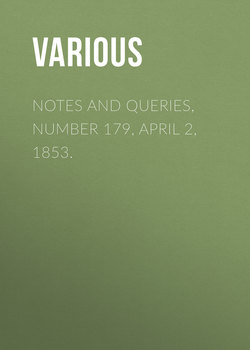Читать книгу Notes and Queries, Number 179, April 2, 1853. - Various - Страница 2
Notes
MYTHE VERSUS MYTH
ОглавлениеWhen I first began to write on Mythology, I followed the Germans in using mythus for the Greek μῦθος. I afterwards thought it would be better to Anglicise it, and, strange to say, I actually found that there was a rule in the English language without an exception. It was this: Words formed from Greek disyllables in ος, whether the penultimate vowel be long or short, are monosyllables made long by e final. Thus, not only does βῶλος make bole, but πόλος pole, πόρος pore, σκόπος scope, τόνος tone, &c.; so also γῦρος, gyre; θύμος, thyme; στῦλος, style; κύβος, cube, &c.: I therefore, without hesitation, made an English word mȳthe. Mr. Grote, in his History of Greece, has done the very same thing, and probably on the same principles, quite independently of me; for, as I am informed, he has never condescended to read my Mythology of Greece and Italy, perhaps because it was not written in German. We have had no followers, as far as I am aware, but Miss Lynn, in her classical novels, and Mr. J. E. Taylor, in his translation of the Pentamerone, &c.
Meantime the English language had got another form of μῦθος, namely, my̆th, which I believe made its first appearance in Mr. Cooley's Maritime and Inland Discovery, and so has the claim of priority, if not of correctness. This form has been so generally adopted, that it seems likely ere long to become a mere slang term. It is used for every kind of fiction whatever; indeed, I have seen it employed where the proper word would be hoax. Nay, to make matters worse, it is actually used of persons. Mrs. Harris, for instance, has been termed a myth, as also was Robin Hood, not long since, even in "N. & Q."! I wonder how Apolodorus would have looked, if he had heard Orion or Polyphemus called a μῦθος!
Do I then expect the people of England to surrender their glorious privilege of going wrong without let or hindrance, in matters of grammar and etymology? Far from me be such folly and presumption. All I venture to expect is, that men of learning and good sense will, when they are speaking or writing about those venerable fictions which once commanded the assent of polished nations, use the more dignified term mȳthe, and the adjective mythic, instead of the hybrid mythical, leaving the poor unhappy little my̆th to be bandied about at the popular will and pleasure.
Thos. Keightley.
